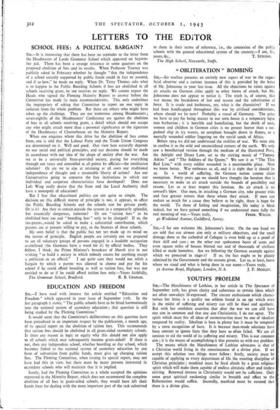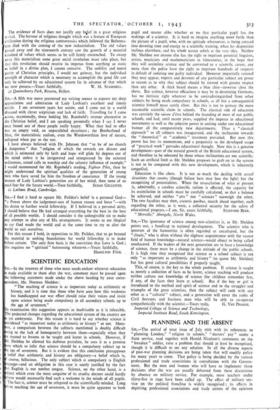YOUTH'S PROBLEM
Snt,—The Marchioness of Lothian, in her article in The Spectator of September ioth, has given clarity and coherence to certain ideas which are often nowadays ill-expressed. The sincere enthusiasm which charac- terises her letter is a quality too seldom found in an age which even in the midst of suffering and misery can still be blasé and apathetic. But with her confident assertion that after the war we can still have one aim in common and that one aim Christianity, I do not agree. The spirit which must fire all ideas of reconstruction must be one of idealism tempered by reality. Idealism is here in plenty but it must be tempered by a stern recognition of facts. It is because man-made solutions have been content to ignore facts that they have so often failed. We are all anxious to rid the world of its suffering and misery. This is our common aim ; it is the means of accomplishing it that presents us with our problem.
The means which the Marchioness of Lothian advocates is that of a Christian world living in the consciousness of a divine plan. If we accept this solution two things must follow: firstly, society must be capable of applying to every department of life the exacting discipline of Christian principles ; mankind must be fired afresh by a great religious spirit which will make them capable of endless altruistic effort and tireless suiting. Renewed interest in Christianity would not be sufficient. Only some great spiritual awakening similar in breadth and effect to the Reformation would suffice. Secondly, mankind must be assured that there is a divine plan. The evidence of facts does not justify any bejief in a great religious revival. The fervour of religious thought which was a feature of European civilisation during the religious controversies which followed the Reforma- tion died with the coming- of the new industrialism. The old values passed away and the nineteenth century saw the growth of a material standard of values which seems to be still firmly entrenched. To sweep away this materialism some great social revolution must take place, but that this revolution should receive its impetus from anything so static as belief in a divine plan, I cannot conceive. The nobility and moral purity of Christian principles, I would not gainsay, but the individual strength of character which is necessary to accomplish the good life can only be achieved by an educational system far in advance of that which we now possess.—Yours faithfully, W. M. SCAMMELL. 45 Queensberry Park, Rosetta, Belfast.



























 Previous page
Previous page